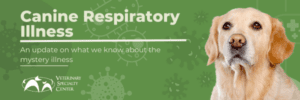Mystery Canine Respiratory Illness

We are continuing to receive a lot of questions from both the referral community and the general public about the current mystery canine respiratory illness that is being covered in the news. While little is still known about this illness, we wanted to share what we do know so far.
What is it and what are the symptoms?
The current illness presents similar to kennel cough but can last much longer. Symptoms include coughing, fever, lethargy, decreased appetite, labored breathing, and discharge from the eyes or nose. It can worsen quickly and can progress to severe pneumonia.
What should dog owners do if they suspect their dog has this illness?
Owners should monitor their dog or dogs for signs of illness. If they notice a persistent cough, it is best to have their pet evaluated by their primary veterinarian to see if the signs are consistent with this infection or some other illness or developing condition such as pneumonia or cardiac disease. Their veterinarian can work on a course of treatment or refer more severe cases to an emergency veterinarian.
What testing is available to diagnose this illness?
Although there is no testing currently available to diagnose this illness, veterinary laboratories in four states are investigating the illness from samples of affected dogs. New Hampshire’s Veterinary Diagnostic Laboratory and the Hubbard Center for Genome Studies say they have used genetic sequencing and have discovered a previously unknown germ. They are calling the pathogen “a funky bacterium”. It is reportedly smaller than a normal bacterium in size making it harder to find and sequence.
What precautions should dog owners take at this time?
This illness is very contagious. The best way for people to protect their dogs is to avoid highly populated areas with exposure to other dogs. Dogs that frequent dog parks, doggy daycare, boarding, and grooming facilities are currently more at risk than dogs that are isolated from other canines. Dogs that are sick should be isolated from other dogs. Senior dogs, those with chronic illnesses, and those with weakened immune systems should also take extra precautions.
Should we dog owners keep routine veterinary appointments and specialty appointments?
Since veterinary teams, including our team at Veterinary Specialty Center (VSC), are experienced with caring for contagious patients (respiratory and gastrointestinal) and those who are immunocompromised, we take extra precautions with our patients to minimize the risk of exposure. With this illness circulating, it is more important than ever for dogs to be up-to-date on their vaccines and wellness exams.
What protections are offered to patients at Veterinary Specialty Center?
For hospitalized patients, VSC has two separate isolation wards with one being specifically engineered for respiratory cases. All of our cages throughout the hospital are also designed to limit patient exposure to respiratory illnesses. Our hospital’s HVAC is also equipped with a special HEPA-filter UV cleaning system to always ensure the best air quality for our team and patients.
Is there a cure or vaccine?
Currently, there is no treatment for this disease and vaccines are not available. However, dog owners should keep their pets up-to-date with vaccines for Influenza and Bordetella (kennel cough).
Are other animals at risk?
While this illness is highly contagious for other dogs, there is no current evidence that it is transmissible to humans and other species.
We will continue to monitor the situation and provide updates as they become available.
